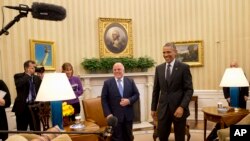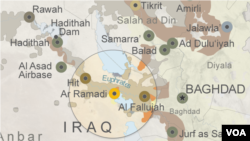U.S. and Iraqi officials appear to be out-of-sync on how best to inflict a lasting defeat on the Islamic State group (IS) as another Iraqi city appears poised to fall into the terror organization’s grip.
Iraqi officials said IS captured three villages on the eastern outskirts of Ramadi, the capital of Iraq’s western Anbar province Thursday, while fighters continued to pressure troops trying to hold the city itself.
Already, Iraqi officials are calling Ramadi’s plight catastrophic, saying at least 2,000 families have fled to take refuge in southern and western suburbs of the Iraqi capital of Baghdad. Some accounts from inside Ramadi describe the city as a ghost town.
Ebb and flow of war
Wrapping up a visit to Washington, Iraqi Prime Minister Haider al-Abadi tried to cast the developments in and around Ramadi as part of the ebb-and-flow of a long war with a savvy enemy.
“This is a war and in a war you can win in a place and lose ... somewhere else,” he told an audience at the Center for Strategic and International Studies (CSIS), saying IS, hurt from a defeat in Tikrit, was likely trying to send a message. “I think it was timed with my visit to the U.S.”
Still, he expressed concerns that new Iraqi brigades set to fight IS in Anbar province were still lacking the necessary equipment.
“These new brigades, they need heavy weapons and I understand these are on the way,” Abadi said. “I hope we receive them in time."
The prime minister also criticized the U.S. and the coalition for failing to respond quickly to Iraqi requests for airstrikes.
“You want the enemy to be hit as quick as possible when you are moving forward,” Abadi said.
U.S. defense officials say that in private meetings, Abadi made clear that with Tikrit largely in Iraqi hands, his next focus is Anbar province, an effort which would require more U.S. assistance. But at a Pentagon briefing Thursday, the highest ranking U.S. military official indicated that while Ramadi is already “a humanitarian problem,” U.S. military priorities lie elsewhere.
“The issue here is not about brick and mortar, it’s about defeating ISIL,” said Joint Chiefs of Staff Chairmen Gen. Martin Dempsey, using an acronym for IS. “I would much rather that Ramadi not fall but it won't be the end of a campaign should it fall.”
Oil
Instead, Dempsey placed higher value on the city of Bayji and the Baiji oil refinery. Both are part of what Dempsey described as a deliberate and measured campaign north and west of Baghdad that has already seen Iraqi forces, with the help of Shi’ite militias and coalition air power, gain control of Tikrit. Both are also under attack from IS fighters.
Dempsey told reporters the refinery itself is "at no risk right now," though he noted militants have penetrated the refinery's outer perimeter.
“Once the Iraqis have full control of Baiji they will control all of their oil infrastructure, both north and south, and deny ISIL the ability to generate revenue through oil,” Dempsey said. “Baiji is a more strategic target.”
There may be other reasons the U.S. is leery of making Ramadi and Anbar province the next target. Defense officials describe Anbar as a series of pockets, some controlled by Iraqi Security Forces with others under control of IS.
Anbar province is also where U.S. troops fought some of their most difficult and bloodiest battles over eight years of combat operations in Iraq. Ramadi was a stronghold for the IS’s predecessor, al-Qaida in Iraq. Another city in Anbar province, Fallujah, was the first city to fall to the Islamic State in January of last year.
“This latest attack on Ramadi is just another indication that what the government of Iraq really needs to do is connect these ink blots, if you will, of their legitimate security forces so that there isn’t this constant back and forth,” Dempsey said. “That was the topic of our conversation with Prime Minister Abadi.”
Understanding IS
The terrorist group's Ramadi offensive may also portend larger problems for the Iraqis, the U.S. and coalition partners.
“Iraq matters to the Islamic State,” said Daveed Gartenstein-Ross, a senior fellow at the Foundation for Defense of Democracies in Washington, speaking of Islamic history. “Without holding territory in Iraq they don’t really have any sort of claim to being a caliphate which is what they’ve staked their legitimacy upon.”
Other analysts warn the group has repeatedly shown it will not go quietly and is often very adept at striking back while seemingly on the run. There are also concerns that many of the underlying grievances against Iraq’s mainly Shi’ite government, which allowed the IS fighters to move easily into largely Sunni areas such as Anbar province, have not been adequately addressed.
“Unless you make the political moves that are needed to address those problems, [IS] is not going to go away,” said Nussaibah Younis at the Project on Middle East Democracy. “You’re always going to have these active terrorist cells who are still going to be able to inflict chaos and mass causalities.”
She also cautioned against thinking the fight in Iraq can be won on the battlefield at all.
“Remember, al-Qaida in Iraq didn’t have territory and yet it was an incredibly powerful and lethal terrorist force that haunted the country,” she said.






